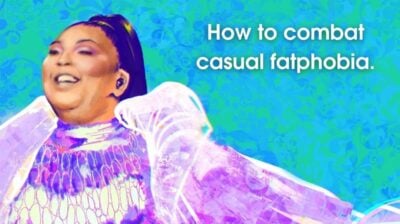How I realised I have an eating disorder in college
This spunout contributor talks about the impact unhealthy message about weight and body shape can have.

I’ve never written anything like this before, but I feel the need to. I love college. My experience in college has been one of the best experiences of my life. I’ve made friends, grown in confidence, learned new things and had absolute belters of nights out.
My experience with an eating disorder
I’ve also had an eating disorder nearly the entire time I’ve been in college. Eating disorders are not uncommon. They’re usually invisible and they can make you so blooming miserable. I have struggled with this for nearly three years. I’ve damaged my health. I’ve damaged my relationships. I’ve lied to people I love and for the life of me I couldn’t tell you why. It’s not like I woke up one day and was suddenly terrified of gaining weight. But I was, and still am, a little bit terrified. I’m not alone in this. I think that feeling is pretty much normalised and the thoughts that drove me to do seriously unhealthy things are normalised too.
Damaging messages
How many times have you heard that you should never snack between meals? That there are ‘no excuses’ for not going to the gym? That you should skip meals before a night out because that way you’ll get drunk faster, and the calories in the alcohol won’t count? Do you ever feel guilty for eating a sandwich, or for eating more than your friends do? Have you ever felt like it was ‘your fault’ that you aren’t dating somebody, or that somebody treated you badly, because you don’t have the ‘willpower’ to be your ‘perfect self?’
Maybe none of this applies to you. Or, maybe it does, but you don’t recognise how damaging these messages are. Maybe you’ve realised that being on a diet makes you sad, but you don’t feel that you can stop because you feel like that’d be ‘giving in.’
Well, I’ll tell you what; you should give in. You should go and get a lovely breakfast roll, or a pot noodle, or a pizza, or whatever it is that you never let yourself have. And I should have too.
Looking for support
The first time I ever had an inkling that what I was doing wasn’t making me happy, I should have looked for help. I didn’t, but now I have. It’s not easy to change but I have had to, and, if you identify with any of this, you may have to too. Be kind to yourself. Ask for help. Know that you are worthy and loved and don’t let something so insignificant impact your life. Whether the rest of the world can see it or not, if you are unhappy then it’s you that can change things.
Reaching out for help
Two years ago I first decided to speak to someone. I said to my mam, “I actually think about food all the time. It’s driving me crazy.” My eating disorder got worse after that. But I pushed through. I talked, and talked, and talked, I told my family, I told my friends. I went to counselling. I forced myself to eat breakfast and to finish my dinner and I did gain weight and continue to gain weight and it’s hard.
But it’s easier when I realise that the person I really am would not find it hard. She knows that I don’t deserve to worry about food and how I look – nobody does. She would not feel guilty, and neither should you. Disordered eating is not your fault, it’s not in your control, and it’s not who you are.
I know it’s scary but if I can leave it behind, you can too.
You deserve to.
If you’re struggling with any kind of eating disorder then your best chance is to go to a professional who can help you through it, a GP or a psychologist, and they can help your recovery. BodyWhys also has lots of useful resources for recovery, including free guides that they’ll send out to you.
Feeling overwhelmed and want to talk to someone?
- Get anonymous support 24/7 with our text message support service
- Connect with a trained volunteer who will listen to you, and help you to move forward feeling better
- Whatsapp us now or free-text SPUNOUT to 50808 to begin.
- Find out more about our text message support service
If you are a customer of the 48 or An Post network or cannot get through using the ‘50808’ short code please text HELLO to 086 1800 280 (standard message rates may apply). Some smaller networks do not support short codes like ‘50808’.






